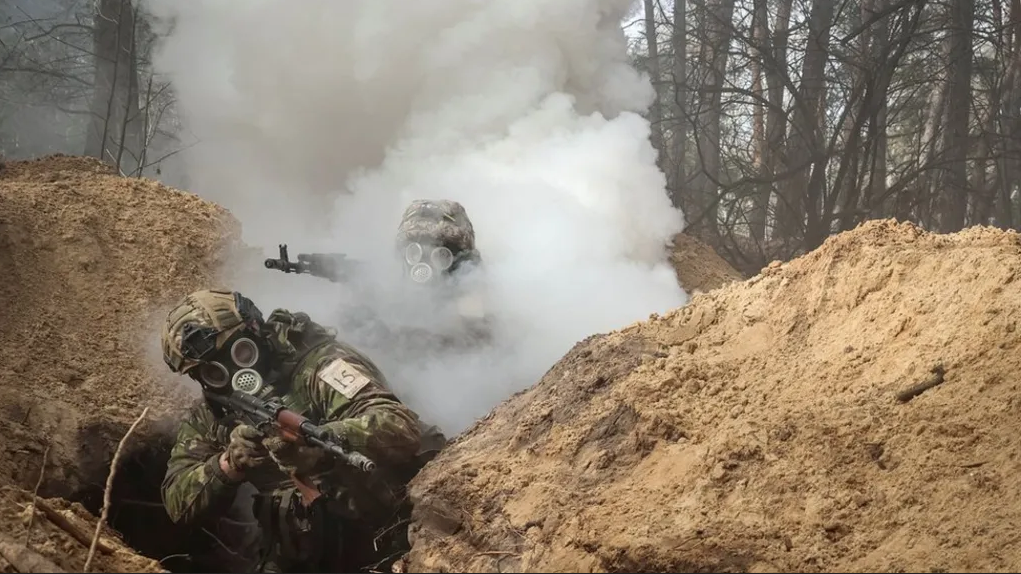The US has accused Russia of deploying chemical weapons as a “method of warfare” in Ukraine, in violation of international laws banning their use.
State department officials said Russia used the choking agent chloropicrin to win “battlefield gains” over Ukraine.
The allegations, which US officials said were not an “isolated” incident, would contravene the Chemical Weapons Convention (CWC), which Russia signed.
The Kremlin has yet to comment, but has denied similar allegations in the past.
The Organisation for the Prohibition of Chemical Weapons (OPCW), a global watchdog that oversees implementation of the CWC, says a chemical weapon is a substance used to cause intentional death or harm through its toxic properties.
In 2017, the OPCW said Russia had destroyed the last of its Cold War-era stockpile of the weapons, as required under the CWC. States are also prohibited from developing or acquiring new weapons under the 1993 convention, which is signed by 193 states.
But Moscow has since been accused of making incomplete declarations of its stockpile, according to the UK’s House of Commons library.
Since 2017, Russia has been accused of at least two chemical attacks – the Salisbury attack on a former Soviet intelligence officer and the 2020 poisoning of the late Russian opposition leader Alexei Navalny.
Chloropicrin – which the US says Russia has used to “dislodge Ukrainian forces from fortified positions” – is an oily substance which was widely used during WW1. It causes irritation of the eyes and skin and can cause vomiting, nausea and diarrhoea, according to the US Centre for Disease Control (CDC).
The chemical’s use in war is expressly banned under the CWC, and is listed as a choking agent by the OPCW.
The state department also said Moscow has regularly used “riot control agents,” or tear gas, during the war.
President Joe Biden has previously warned Russia against deploying chemical weapons in Ukraine. In March 2022, just weeks after Moscow launched its invasion, Mr Biden vowed that Russia would pay a “severe price” if it did use chemical weapons.
“We would respond if he uses it. The nature of the response would depend on the nature of the use,” the president said.
But there have been consistent reports that Moscow has ignored that warning. US Assistant Secretary for Arms Control Mallory Stewart has previously said Russia was using riot control agents in the conflict.
And Ukraine says its troops have faced mounting chemical attacks in recent months. The Reuters news agency reported earlier this year that Russian forces have used grenades loaded with CS and CN tear gasses.
The report added that at least 500 Ukrainian soldiers have been treated for exposure to toxic gasses, and that one had died after suffocating on tear gas.
State department officials said they were sanctioning three Russian-state bodies linked to the country’s biological and chemical weapons programme, and four firms which contributed to the government entities.
Russia has repeatedly denied deploying chemical weapons in the conflict.
“There are no chemical weapons in the stockpiles of the Russian army, as confirmed by international investigations,” its embassy in the Netherlands said in January.
The allegations come as part of a broader tranche of US sanctions which targeted 30 individuals, including three people officials say were involved in the death of Mr Navalny.
The men are all officials at the Siberian prison colony where the opposition activist was killed earlier this year. Russia denies involvement in the opposition leader’s death.
Meanwhile, Russian forces in eastern Ukraine have continued their steady advance ahead of the country’s Victory Day celebrations on 9 May – the holiday commemorating the Soviet victory in World War Two.
Much of the fighting has been taking place around Chasiv Yar, a Kyiv-controlled stronghold which Russia has been trying to reach after seizing the city of Avdiivka.
It comes as President Volodymyr Zelensky dismissed the head of Ukraine’s Security Service’s (SBU) cyber-security department, Illya Vityuk, amid allegations that he tried to use his position to punish a Ukrainian journalist who had reported on allegations of corruption against him.
The reporter was subsequently summoned to a military recruitment centre, prompting military chief Col Gen Oleksandr Syrskyi to launch an investigation.
Elsewhere, Human Rights Watch – a non-governmental organisation – has called for a war crimes investigation after it unearthed evidence that Russian forces executed over a dozen surrendering Ukrainian troops. The events allegedly occurred between December 2023 and February 2024, the body said in a statement.
Stay informed with The Namibian – your source for credible journalism. Get in-depth reporting and opinions for
only N$85 a month. Invest in journalism, invest in democracy –
Subscribe Now!






